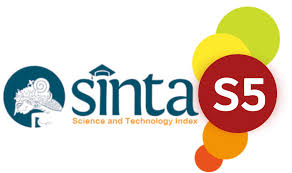PARADIGMA PENDIDIKAN BERBASIS KEUNGGULAN LOKAL DI PERGURUAN TINGGI DAN RELEVANSINYA TERHADAP PEMBANGUNAN EKONOMI RIAU
DOI:
https://doi.org/10.35446/dayasaing.v8i3.1117Keywords:
Pendidikan Berbasis Keunggulan Lokal, Pembangunan Ekonomi RiauAbstract
Kajian ini merupakan studi literature yang bertujuan untuk mnganalisis relevansi konsep pendidikan di perguruan tinggi yang berbasis keunggulan lokal terhadap pembangunan dan pertumbuhan ekonomi di Riau. Untuk menganalisis konsep pendidikan di perguruan tinggi tersebut dalam menekan angka pengangguran di Riau. Untuk menganalisis konsep pendidikan di perguruan tinggi yang berbasis keunggulan lokal terhadap pengembangan wilayah di Riau.Hasil dari kajian ini bahwa konsep pendidikan berbasis keuanggulan local hanya sampai pada tingkat pendidikan dasar an menengah saja. Konsep pendidikan dapat diarahkan ke konsep pendidikan berbasis keunggulan local. Sejauh ini perguruan tinggi di Riau hanya memasukkan mata kuliah Enterpreneurship Education (EE) kedalam kurikulum dan melaksanakan program kampus merdeka yang dikeluarkan oleh pemerintah
References
Biriescu, S., & Babaita, C. (2014). Rural Education, an Important Factor of Regional Development in the Context of Local Government Strategies. Procedia - Social and Behavioral Sciences, 124, 77–86. https://doi.org/10.1016/j.sbspro.2014.02.462
Bramwell, A., & Wolfe, D. A. (2008). Universities and regional economic development: The entrepreneurial University of Waterloo. Research Policy, 37(8), 1175–1187. https://doi.org/10.1016/j.respol.2008.04.016
Carpenter, A., & Wilson, R. (2022). A systematic review looking at the effect of entrepreneurship education on higher education student. International Journal of Management Education, 20(2). https://doi.org/10.1016/j.ijme.2021.100541
Djatmiko, O. I. W. (n.d.). Pendidikan Vokasi Bercirikan Keunggulan Lokal. 1–7.
Hamdan, A., Sarea, A., Khamis, R., & Anasweh, M. (2020). A causality analysis of the link between higher education and economic development: empirical evidence. Heliyon, 6(6), e04046. https://doi.org/10.1016/j.heliyon.2020.e04046
International Labour. (2020). Global Employment Trends for Youth 2020: Technology and the future of jobs. In International Labour Organization. https://www.ilo.org/wcmsp5/groups/public/---dgreports/---dcomm/---publ/documents/publication/wcms_737648.pdf
Lazzeretti, L., & Tavoletti, E. (2005). Higher education excellence and local economic development: The case of the entrepreneurial University of Twente. European Planning Studies, 13(3), 475–493. https://doi.org/10.1080/09654310500089779
Marquez-Ramos, L., & Mourelle, E. (2019). Education and economic growth: an empirical analysis of nonlinearities. Applied Economic Analysis, 27(79), 21–45. https://doi.org/10.1108/AEA-06-2019-0005
McMahon, W. W. (2018). The total return to higher education: Is there underinvestment for economic growth and development? Quarterly Review of Economics and Finance, 70, 90–111. https://doi.org/10.1016/j.qref.2018.05.005
Nugraheni, D. P., & Nugraheni, D. P. (2021). Pendidikan Kejuruan Berbasis Kearifan Lokal Solusi Atasi Pengangguran di Indonesia. Journal of System, Information Technology and Electronics Engineering, 1(1), 20–26. http://e-journal.ivet.ac.id/index.php/jsite/article/view/1716
Salamzadeh, Y., Sangosanya, T. A., Salamzadeh, A., & Braga, V. (2022). Entrepreneurial universities and social capital: The moderating role of entrepreneurial intention in the Malaysian context. International Journal of Management Education, 20(1). https://doi.org/10.1016/j.ijme.2022.100609
Teichler, U. (2015). Education and Employment. In International Encyclopedia of the Social & Behavioral Sciences: Second Edition (Second Edi, Vol. 7). Elsevier. https://doi.org/10.1016/B978-0-08-097086-8.92059-2
Tinoco, T. (2003). Does education matter?: Myths about education and economic growth. Revista de Administração de Empresas, 43(4), 110–111. https://doi.org/10.1590/s0034-75902003000400009










